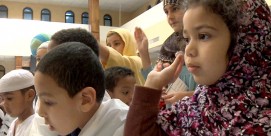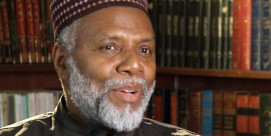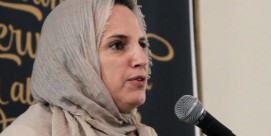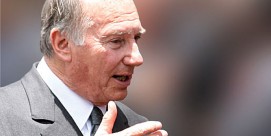In This Episode << SLIDE LEFT TO SEE ADDITIONAL SEGMENTS
Faith Based Humanitarian Aid in Afghanistan
Watch Matthew McGarry, Catholic Relief Service’s country representative in Afghanistan, share his thoughts about new US strategy, interfaith relations, and the militarization of humanitarian development. He spoke in Washington on April 17, 2009 at the Brookings Institution:
The challenge is that, and what we’ll wait and see, is whether the actions follow through with the dialogue and that, you know, it’s a very challenging place to work. There’s a lot of things that could go wrong, and so we’re hopeful that this dialogue that’s starting now, that these positive indications are then carried through into actual policy decisions and actions on the ground. In terms of our perspective as a faith-based organization, we’re extremely explicit that we’re not in Afghanistan to proselytize, to convert anyone. That’s not the way we work anywhere. It’s one of the guiding principles of our organization is that we are not missionaries. We’re serving people based on need, not on creed. We’re not—in any of the 99 countries where CRS [Catholic Relief Services] works we don’t do that kind of thing. All the more so in Afghanistan, where that’s completely unacceptable to the local population, to the government. It’s actually illegal. It’s not something that would enable us to be a useful or productive or helpful organization, so—but just, you know, from our perspective, I guess anyway, it is important as the higher level policy discussions go on to bear in mind kind of the, you know, the faithfulness of the people of Afghanistan, the extreme commitment to their values, to their religion, to their beliefs, that every step that’s made in terms of security, in terms of development needs to bear that in mind, that religion, that people’s faith is central to every aspect of their daily life in Afghanistan, and not taking that into account can undermine every other positive thing that the [Obama] Administration might want to do.
In terms of, you know, interfaith, I do try to be pretty conscientious about not discussing religion with people, again, just because of the nature of who we are and kind of the sensitivities around individuals’ faith and the need to be absolutely respectful, and we completely keep our work completely separate from that and never have the slightest perception that we’re trying to influence anyone or, you know, change their beliefs or anything like that. We don’t have much in the way of explicit conversations for their safety, for my safety, for the safety of the organization. I would just say that having been there for a year now and having been in Pakistan for several years before that and having been in Sudan for about a year and a half before that I’ve had the opportunity to celebrate a number of Ramadan celebrations, or Ramazan, depending on where it is, you know, various Eids – Eid al Fitr and Eid al Adha, you know, and being able to participate in those and really observe, from a certain distance certainly, the degree of faithfulness and just the impact that people’s beliefs, that, you know, Muslim colleagues, that their faith has on their work, everything they do, every aspect of their life, and to be welcomed into that, into these societies, into these cultures where hospitality is another central, foundational aspect of daily life, and to be allowed to witness it and to a limited degree participate in it has been very, you know, rewarding and pleasing for me.
The discussion about the militarization of aid, kind of the blurring of the lines between some of these provincial reconstruction teams and more traditional development actors, CERP [Commander’s Emergency Response Program] funding, things of that nature, is a significant concern for us on a variety of different levels. One is just purely in terms of the safety perspective—that the only thing that really keeps us safe in places where we work is community acceptance. We don’t have armed guards. We don’t travel in armored vehicles. We do have secure compounds and we do have guards on staff, but we do not have a major deterrent capacity, so what keeps us safe is the communities where we work, where we live, being willing to accept us and welcome us into their communities. If the line is blurred with the military, and if it’s not clear, you know, who development actors are, who the military is, much of that goes away, and then we’re no longer safe, and similarly for our beneficiaries, for the villagers who we work with, if they’re perceived as openly collaborating with military efforts that could make them much less safer. So just purely from a security perspective it’s not something we can engage in. We can’t be perceived as being, you know, closely linked or partnered with the military because we will become targets if that happens. From an operational perspective it’s also a concern, because one of our strengths as a development organization is the fact that we have long-term presences in these communities, that the vast, vast majority of our staff are Afghans who speak the language, who know the culture, who understand the communities, who know the operating environment, and who have been there their entire lives and are going to be there for the foreseeable future. From my perspective that gives us a distinct advantage over a military organization on a six-month or one-year rotation with a very, very light reliance on Afghans—maybe the only Afghan staff are actually translators. So I think that if you’re looking to do sustainable, long-term development that actually has some sort of an impact, that’s not quick impact, that’s not just trying to win hearts and minds for today but actually will have some sort of sustainable positive impact on people’s lives, the way to do that is the way that we do it, and I don’t know that that’s—that’s not something we can negotiate on. That’s not something we can change.







